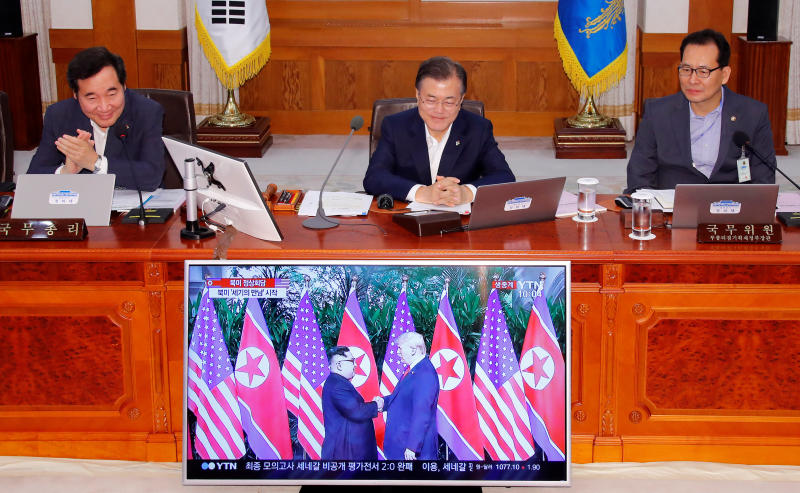Trump-Kim summit agreement gives Moon Jae In mandate to pursue inter-Korea peace, collaboration
Sign up now: Get ST's newsletters delivered to your inbox

South Korean President Moon Jae In looking at a broadcast of the Singapore summit during a Cabinet meeting at the Presidential Blue House in Seoul, on June 12, 2018.
PHOTO: REUTERS
Follow topic:
SEOUL - South Korean President Moon Jae In will benefit from the cordial summit between North Korean leader Kim Jong Un and US President Donald Trump despite the lack of a detailed, substantive road map on denuclearisation at the end of the meeting in Singapore, analysts say.
The summit outcome would provide a boost to Mr Moon's popularity just a day ahead of local elections and give him the mandate to push for more peace efforts and inter-Korea collaboration, they said.
In a bid to bring the US and North Korea back to the negotiating table, Mr Moon has been trying to mediate between the two and encouraging them to compromise.
Mr Moon, who pledged a new era of peace together with Mr Kim in their first meeting at the truce village of Panmunjom on April 27, has been pushing for a peace declaration to end the 1950-1953 Korean War. Fighting was halted only by an armistice.
Mr Trump and Mr Kim - whose official title is Chairman of State Affairs Commission, the nation's highest decision-making body - signed an agreement in Singapore to commit to establishing new bilateral relations, join efforts in "building a lasting and stable peace regime on the Korean Peninsula", and recover remains of prisoners of war.
North Korea also reaffirmed the inter-Korea Panmunjom Declaration signed on April 27, and committed to "work towards complete denuclearisation of the Korean Peninsula".
South Korea would welcome the fact that the two leaders met and agreed on "complete denuclearisation" and peace building, analysts say.
Dr Lee Seong Hyon, director of unification strategy at the Sejong Institute think-tank, said the Singapore summit was "historic" in itself and served its purpose.
"They agreed on denuclearisation in principle and there will be operational content to follow. Moon must have been relieved," he told The Straits Times.
Dr Lee added that the signing of an agreement between Mr Trump and Mr Kim also put on paper North Korea's commitment to denuclearisation.
"Now, Trump has it in writing. Based on this principle, the two can move forward to hammer out details. It's important that they don't leave the details to working-level officials completely. They know that there are decisions only they can make, not lower-level officials."
Some experts expected more details like a road map to denuclearisation, but Professor John Delury of Yonsei University said "even a general commitment essentially passes the bar".
"Even moving it forward will allow President Moon to pursue inter-Korean peace, a whole set of things the two Koreas can work on to improve their relationship: security, reconciliation, cultural exchange, softer things," he said at a panel discussion held in Singapore.
"Even just an okay, so long as there's no meltdown here in the next 48 hours or on Twitter afterward, President Moon can say that went well."
Dr Kim Ji Yoon of the Asan Institute for Policy Studies noted that Mr Moon's approval ratings shot over 80 per cent over the inter-Korea summit in April, and the figure can increase because Trump-Kim talks turned out well.
"(It) can go to 90 per cent," she said.
The timing could not be better, as the summit came a day before South Korea's local elections which the ruling Democratic Party is widely tipped to win. South Koreans will go to the polls on Wednesday to elect city mayors, provincial governors, education superintendents and other local officials. Various opinion polls show that the ruling party, bolstered by Mr Moon's high popularity, is set for a landslide victory.
Additional reporting by Charissa Yong in Singapore

